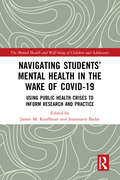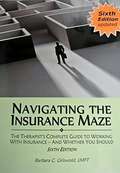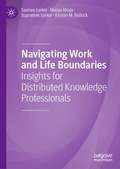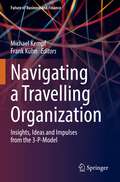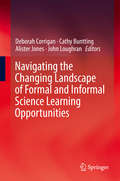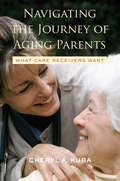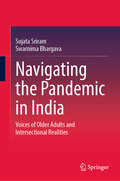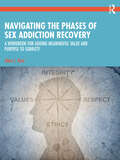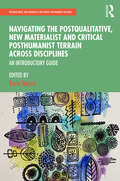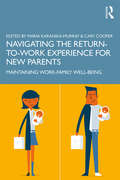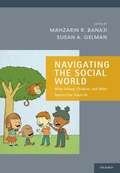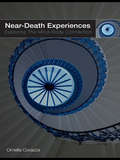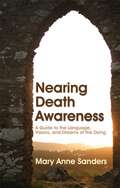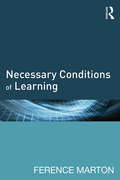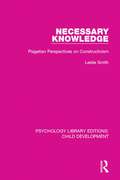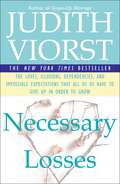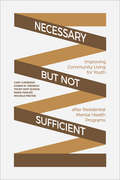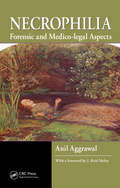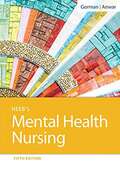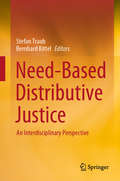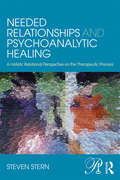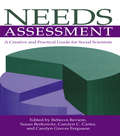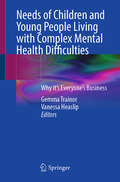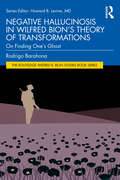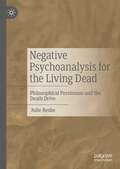- Table View
- List View
Navigating Students’ Mental Health in the Wake of COVID-19: Using Public Health Crises to Inform Research and Practice (The Mental Health and Well-being of Children and Adolescents)
by James M. Kauffman Jeanmarie BadarThis book highlights the effects of the COVID-19 pandemic on the mental health needs of children and adolescents in order to shed light on future practice and reform needed to better deal with the aftermath of such devastating events. The book identifies the conditions during any public health crisis that heighten the mental health needs of children and adolescents and suggests the reforms of mental health services needed to better meet the needs of children and youths during and following pandemics and other public health crises. Importance is placed not only on addressing the effects of COVID-19 but on anticipating and preparing for other public health disruptions to the lives of those who have not reached adulthood. Although mental health services in all settings are considered, special attention is given to the role of schools in providing for the mental health of children and adolescents and preparing for the mental health implications of future public health disruptions. The book will be of equal use to both students and researchers in the fields of mental health, well-being, and education as well as teachers, educational psychologists, social workers, and practitioners working in schools and communities to address students’ mental health needs. It will help readers better understand how and why COVID-19 was a negative influence on students’ mental health, and unpack how best to deal with the aftermath of the pandemic.
Navigating The Insurance Maze: The Therapist's Complete Guide to Working With Insurance -- And Whether You Should
by Barbara GriswoldIt's a simple truth: If you're a psychotherapist, and don't take insurance, you're missing out on many potential client referrals. And chances are you've lost some terrific clients who couldn't afford to continue in therapy without seeing a provider covered by their health plan. Whether you've thought about accepting insurance, you already work with a few companies, or you're an insurance "veteran," this is a must-have reference. Written by a psychotherapist with 14 years' experience working with more than 25 insurance networks, this practical manual won't gather dust on your bookshelf; you will use it again and again in your practice. In an easy-to-follow format, it answers all your questions about working with employee assistance, managed care, and traditional insurance plans.
Navigating Work and Life Boundaries: Insights for Distributed Knowledge Professionals
by Saonee Sarker Manju Ahuja Suprateek Sarker Kirsten M. BullockAs organizations continue to adapt and evolve to meet the challenges related to globalization and working with new collaboration technologies to bridge time and space, demands on employees’ time and attention continue to increase. Recognizing this problem and its implications, such as increased employee turnover, many companies are seeking ways to help their employees maintain a healthy balance between work and life. This book examines work-life conflict, i.e., the increasing lack of employees’ work-life balance, in the context of virtual teams and distributed work. It explores the negative impact on work-life conflict exacerbated by working across time zones, cultures, and geographical spaces. Further, it investigates specific causes of work-life conflict in distributed work environments. For researchers and practitioners in the HRM and OB domains, this book adds to the body of knowledge on work-life conflict, with a unique focus on the role of technology.
Navigating a Travelling Organization: Insights, Ideas and Impulses from the 3-P-Model (Future of Business and Finance)
by Frank Kühn Michael KempfThis book dives deep into the "Three Pillar Model" (3-P-Model) applied by the authors for organizations. These pillars are: Sustainable Purpose, Traveling Organization, and Connected Resources. The authors specifically concentrate on the pillar Traveling Organization and help in understanding the concept, its design, and navigation in practice. The expert contributors also show the relevance of the 3-P-Model in diverse areas – from profit and public organizations to the catholic church and cultural work. The navigation is aligned with the pillar Sustainable Purpose and connects professional topics, organizations, and people as three core resources. Organizational scientists, business strategists, and executive MBA students will particularly benefit from this book.
Navigating the Changing Landscape of Formal and Informal Science Learning Opportunities
by John Loughran Alister Jones Cathy Buntting Deborah CorriganThis book presents research involving learning opportunities that are afforded to learners of science when the focus is on linking the formal and informal science education sectors. It uses the metaphor of a "landscape" as it emphasises how the authors see the possible movement within a landscape that is inclusive of formal, informal and free-choice opportunities. The book explores opportunities to change formal school science education via perspectives and achievements from the informal and free-choice science education sector within the wider lifelong, life-wide education landscape. Additionally it explores how science learning that occurs in a more inclusive landscape can demonstrate the potential power of these opportunities to address issues of relevance and engagement that currently plague the learning of science in school settings. Combining specific contexts, case studies and more general examples, the book examines the science learning landscapes by means of the lens of an ecosystem and the case of the Synergies longitudinal research project. It explores the relationships between school and museum, and relates the lessons learned through encounters with a narwhal. It discusses science communication, school-community partnerships, socioscientific issues, outreach education, digital platforms and the notion of a learning ecology.
Navigating the Journey of Aging Parents: What Care Receivers Want
by Cheryl A. KubaNavigating the Journey of Aging Parents proposes an entirely unique approach to the field of gerontology, giving dependent care receivers a voice. Caregivers will be made aware of what care receivers truly want during life's final chapters. Exploring issues of housing, spirituality, personal care and death, Cheryl Kuba has created a testament to the dependent elderly. This book draws on numerous interviews with aging people and discusses common caregiver mistakes and interpretations, what a caregiver should expect when an aging parent moves in, and how to care for an aging parent from afar. Kuba also delves into such phenomena as guilt, role reversal, changing family dynamics, financial stress, and caring for oneself while caring for another. The 22.4 million elderly people being cared for in the United States comprises the fastest growing segment of the population, making this reference on the opinions and concerns of care receivers invaluable.
Navigating the Pandemic in India: Voices of Older Adults and Intersectional Realities
by Sujata Sriram Swarnima BhargavaThis book weaves together intersectional threads that underlie the experiences of older men and women in India during the Covid-19 pandemic. While older adults were considered particularly vulnerable to the scourge of the pandemic, there is scant first-hand evidence about how they understood the pandemic and how they were affected by it. Data about the effects of the virus on this population, as communicated by the government and the press, resulted in reductive/problematic narratives that shaped and colored their lives. The intersectional lens used in the book highlights the differential impacts of poverty, (dis)ability, gender, civil status, and health status on the experiences of older adults during the pandemic. This book brings forth first-person narratives of older adults navigating the Covid-19 pandemic in India. It is a handy ready reckoner for mental health and medical professionals, students in qualitative research methods, psychology, social work, geriatric medicine, health and public health, and public administration. The book's findings are provocative and generate curiosity about the lives and experiences of an age category seldom focused on.
Navigating the Phases of Sex Addiction Recovery: A Workbook for Adding Meaningful Value and Purpose to Sobriety
by Allan J. KatzDesigned for use with clients recovering from sex addiction, this book guides readers through discovering the essential skills for their sober journey and find meaning and purpose in life through character development and emotional maturity, while improving their relationship with healthy intimacy. This workbook answers the question, “I’m sober, now what?”. It contains concise exercises and take the readers on a journey that will give them an insight into what is holding them back from a life worth living, finally living in serenity, learning the art of surrender, and finding true hope and freedom in recovery. With alternating chapters presenting problems and solutions, this workbook is designed to lead the reader through the stages of recovery while gaining skills in mindfulness, emotional regulation, and impulse control.
Navigating the Postqualitative, New Materialist and Critical Posthumanist Terrain Across Disciplines: An Introductory Guide (Postqualitative, New Materialist and Critical Posthumanist Research)
by Karin MurrisNavigating the Postqualitative, New Materialist and Critical Posthumanist Terrain Across Disciplines is an accessible introductory guide to theories, paradigm shifts and key concepts in postqualitative, new materialist and critical posthumanist research. Supported by its own website, this first book in a larger series is an essential companion to the primary texts and original sources of the theorists discussed in this and other books in the series. Disrupting the theory/practice divide, the book offers a postqualitative reimagining of traditional research processes. In doing so, it guides readers through the contestation of binaries, innovative concepts, and the practical provocations that make up the postqualitative terrain. It orients the researcher in the ontological re-turn also by considering Indigenous knowledges, African, Eastern and young children’s philosophies. The style itself is postqualitative through diffractive engagements by the authors and the website includes some examples of the practical provocations described in the book that give an imaginary of how postqualitative research can be taught and enacted. This book is an essential resource for novice as well as experienced researchers working both within and across disciplines in higher education.
Navigating the Return-to-Work Experience for New Parents: Maintaining Work-Family Well-Being
by Cary Cooper Maria Karanika-MurrayParenthood can be one of the most fulfilling, altering, and challenging life events. This book is set within the background of the reality of many parents’ return-to-work experience, the task of re-engaging with work and maintaining a job or a career, and the difficulties that parenthood poses for balancing the demands of a new family with the demands of work. It helps us understand this reality, give voice to new parents, and offer relief in the knowledge that we know a lot about these challenges and, most importantly, how we can start to address them. The book brings together a number of internationally recognized experts from research, practice, and policy to explore the issues and offer evidence-based solutions around return-to-work after having children. It takes a balanced approach to theory and practice to cover topics such as equality, stereotypes, work-family conflict, training and development, and workplace culture, among others, whilst integrating research and policy, and illustrating learnings with case studies from parents and examples from countries that lead the way. It will appeal to parents, researchers, and employers in any sector or economy across the world. Ultimately, it will help develop ways for new parents to re-engage with work successfully while maintaining their work-family well-being.
Navigating the Social World: What Infants, Children, and Other Species Can Teach Us (Social Cognition and Social Neuroscience)
by Mahzarin R. Banaji Susan A. GelmanNavigating the social world requires sophisticated cognitive machinery that, although present quite early in crude forms, undergoes significant change across the lifespan. This book will be the first to report on evidence that has accumulated on an unprecedented scale, showing us what capacities for social cognition are present at birth and early in life, and how these capacities develop through learning in the first years of life. The volume will highlight what is known about the discoveries themselves but also what these discoveries imply about the nature of early social cognition and the methods that have allowed these discoveries -- what is known concerning the phylogeny and ontogeny of social cognition. To capture the full depth and breadth of the exciting work that is blossoming on this topic in a manner that is accessible and engaging, the editors invited 70 leading researchers to develop a short report of their work that would be written for a broad audience. The purpose of this format was for each piece to focus on a single core message: are babies aware of what is right and wrong, why do children have the same implicit intergroup preferences that adults do, what does language do to the building of category knowledge, and so on. The unique format and accessible writing style will be appealing to graduate students and researchers in cognitive psychology, developmental psychology, and social psychology.
Near-Death Experiences: Exploring the Mind-Body Connection
by Ornella CorazzaNear death experiences fascinate everyone, from theologians to sociologists and neuroscientists. This groundbreaking book introduces the phenomenon of NDEs, their personal impact and the dominant scientific explanations. Taking a strikingly original cross-cultural approach and incorporating new medical research, it combines new theories of mind and body with contemporary research into how the brain functions. Ornella Corazza analyses dualist models of mind and body, discussing the main features of NDEs as reported by many people who have experienced them. She studies the use of ketamine to reveal how characteristics of NDEs can be chemically induced without being close to death. This evidence challenges the conventional ‘survivalist hypothesis’, according to which the near death experience is a proof of the existence of an afterlife. This remarkable book concludes that we need to move towards a more integrated view of embodiment, in order to understand what human life is and also what it can be. Ornella Corazza is a NDE researcher at the School of Oriental and African Studies (SOAS), University of London. In 2004-5 she was a Member of the 21st Century Centre of Excellence (COE) ‘Program on the Construction of Death and Life Studies’ at the University of Tokyo.
Nearing Death Awareness: A Guide to the Language, Visions, and Dreams of the Dying
by Mary Anne SandersDying is a complex experience for the dying person and their family, friends, and carers, that involves all aspects of what it means to be human: physical, mental, and spiritual. The author describes different types of Nearing Death Awareness (NDA), including visions, dreams, and symbolic language, and offers practical guidance for family and carers of the dying about how to respond appropriately and supportively to NDA behavior. This sensitive and informative book will make fascinating reading not only for anyone who is likely to accompany a dying person, but for anyone with an interest in spirituality.
Necessary Conditions of Learning
by Ference MartonNecessary Conditions of Learning presents a research approach (phenomenography) and a theory (the variation theory of learning) introduced and developed by Ference Marton and taken up by his wide and varied following around the world—together with their practical applications in educational contexts. Reflecting Marton’s whole lifetime's work, the unique and significant contribution of this book is to offer an evidence-based answer to the questions "How do we make novel meanings our own?" and "How do we learn to see things in more powerful ways?" The presentation makes use of hundreds of empirical studies carried out in Europe and Asia which build on the theory. The line of reasoning and the way in which the examples are put together is consistent with the theory—it is both presented and applied. The main argument is that in order to learn we have to discern, and to discern the intended ideas we must be presented with carefully structured variation, against a background of invariance. We then go through processes of contrast, generalization, and fusion in order to make sense. These insights form a practical framework for those who design teaching and teaching materials. Necessary Conditions of Learning is a major original work for which scholars of pedagogical theory have been waiting a long time.
Necessary Knowledge: Piagetian Perspectives on Constructivism (Psychology Library Editions: Child Development #13)
by Leslie SmithOriginally published in 1993, this monograph addresses a central problem in Piaget’s work, which is the temporal construction of necessary knowledge. The main argument is that both normative and empirical issues are relevant to a minimally adequate account of the development of modal understanding. This central argument embodies three main claims. One claim is philosophical. Although the concepts of knowledge and necessity are problematic, there is sufficient agreement about their core elements due to the fundamental difference between truth-value and modality. Any account of human rationality has to respect this distinction. The second claim is that this normative distinction is not always respected in psychological research on the origins of knowledge where emphasis is placed on the procedures and methods used to gain good empirical evidence. An account of the initial acquisition of knowledge is not thereby an account of its legitimation in the human mind. The third claim relates to epistemology. Intellectual development is a process in which available knowledge is used in the construction of better knowledge. The monograph identifies features of a modal model of intellectual construction, whereby some form of necessary knowledge is always used. Intellectual development occurs as the reduction of modal errors through the differentiation and coordination of available forms of modal understanding. Piaget’s work continues to provide distinctive and intelligible answers to a substantive and outstanding problem.
Necessary Losses: The Loves Illusions Dependencies and Impossible Ex
by Judith ViorstFrom grief and mourning to aging and relationships, poet and Redbook contributor Judith Viorst presents a thoughtful and researched study in this examination of love, loss, and letting go.Drawing on psychoanalysis, literature, and personal experience, Necessary Losses is a philosophy for understanding and accepting life’s inevitabilities. In Necessary Losses, Judith Viorst turns her considerable talents to a serious and far-reaching subject: how we grow and change through the losses that are a certain and necessary part of life. She argues persuasively that through the loss of our mothers’ protection, the loss of the impossible expectations we bring to relationships, the loss of our younger selves, and the loss of our loved ones through separation and death, we gain deeper perspective, true maturity, and fuller wisdom about life. She has written a book that is both life affirming and life changing.
Necessary but Not Sufficient: Improving Community Living for Youth after Residential Mental Health Programs
by Gary Cameron Karen M. Frensch Trudy Smit Quosai Mark Pancer Michele PreydeYouth residential mental health care is often a last resort after a long time searching for help. Despite engaging with residential care, moving from residential mental health programs to life in the community, many youth still confront disturbing prospects. Incorporating vignettes, chapter summaries, as well as theory and evidence in fields such as education, juvenile justice, child welfare, independent living, supporting families, and positive youth development, this book proposes a template that is both credible and feasible for improving community living outcomes for youth leaving residential mental health programs.
Necrophilia: Forensic and Medico-legal Aspects
by Anil AggrawalNecrophilia: Forensic and Medico-legal Aspects is the first text that deals with the scientific aspects of necrophilia from a multidisciplinary point of view. After an introduction that provides a general scientific, social, and historical perspective, this volume:Explores causes and contributing factors, covering biological theories and genetics, as well as trauma, brain anomalies, and substance abuseOffers an original approach to classification, creating ten levels of severity from role playing to homicidal necrophiliaDiscusses necrophilia epidemiology, exploring offender characteristics and habitsProvides 20 case studies of infamous as well as less publicized casesDetails the forensics approach to necrophilia investigationExamines current legislation and mores across the worldExplains the challenges involved with providing expert testimony
Neeb's Mental Health Nursing
by Linda M. Gorman Robynn AnwarHere’s the must-know information LPN/LVN students need to care for patients with mental health disorders where they’ll encounter them - in general patient care settings. <p><p> An easy-to-read, conversational writing style shows you how to recognize and respond to the most important mental health issues. You’ll also explore important communication techniques, ethical and legal issues, and alternative and complementary treatments. Coverage of nursing interventions, basic psychiatric nursing skills, and psychopharmacology prepares you for the NCLEX-PN® exam and clinical practice.
Need-Based Distributive Justice: An Interdisciplinary Perspective
by Bernhard Kittel Stefan TraubThis book explores the foundations and potential of a theory of need-based distributive justice, supported by experimental evidence. The core idea is that need-based distributive justice may have some legitimatory advantages over other important principles of distribution, like equality and equity, and therefore involves less dispute over the distribution and redistribution of scarce resources.In seven chapters, eleven scholars from the fields of philosophy, psychology, sociology, political science and economics outline the normative and positive building blocks of such a theory by critically reviewing the literature on distributive justice from their respective disciplinary perspectives. They address important theoretical and practical issues concerning the rationality of needs identification at the individual level and the recognition of needs at the societal level. They also investigate whether and how the dynamics of distribution procedures that allocate resources according to the need principle leads to social stability, focusing on the economic incentives that arise from need-based redistribution. The final chapter provides a synthesis and outlines a framework for a theory of justice based on ten hypotheses derived from the insights presented.
Needed Relationships and Psychoanalytic Healing: A Holistic Relational Perspective on the Therapeutic Process (Psychoanalysis in a New Key Book Series)
by Steven SternNeeded Relationships and Psychoanalytic Healing is both a personal analytic credo and a multidimensional approach to thinking about clinical interaction. The book’s central theme is that of analytic needed relationships—the science and art of co-creating unique, evolving relational experiences fitted to each patient’s implicit therapeutic aims and needs. Steven Stern argues that, while we need psychoanalytic theories to "grow the receptors and processors" necessary to sense, understand, and connect with our patients, these often tend to frame the therapist’s participation in terms of theoretical and technical categories rather than offering a more holistic view of the relationship in all of its human complexity. Stern believes that a new set of higher order constructs is needed to counteract this tendency. In addition to his own concept of needed relationships, he invokes principles from the work of renowned developmental researcher and theorist, Louis Sander: especially his concept of relational fittedness. Stern draws on the work of Freud, Bion, Winnicott, Kohut, and a broad spectrum of contemporary psychoanalytic authors, in fleshing out the therapeutic implications of Sander’s (and Stern’s own) vision. The result is a rich, humane, and accessible narrative. Needed Relationships and Psychoanalytic Healing offers diverse clinical examples in which you will find Stern engaging with each of his patients in idiomatic, spontaneous ways as he attempts to contour interventions to the evolving analytic situation. This case material will inspire therapist-readers to feel freer to find their own creative voices and idioms of participation, as they seek to meet each patient within the psychoanalytic space. The book is intended for psychoanalysts and psychodynamic therapists at all levels of experience, including those in training.
Needs Assessment: A Creative And Practical Guide For Social Scientists
by Rebecca ReviereFirst published in 1997. Routledge is an imprint of Taylor & Francis, an informa company.
Needs of Children and Young People Living with Complex Mental Health Difficulties: Why it’s Everyone’s Business
by Vanessa Heaslip Gemma TrainorThis book highlights how it is increasingly important that nurses and other health and social care professionals working with or caring for children and young people (CYP) can contribute to the care and support these vulnerable individuals need. Given the limited specialist mental health services available for CYP, this book helps to recognise when referral to specialist services is required. It is aimed at providing nurses, other health and social care professionals with a comprehensive understanding of some of the complex mental health issues faced by young people today and to provide them with confidence in how to interact helpfully with them. While covering a range of complex mental health issues (such as self-harm, eating disorders, and psychosis) this book also explores wider factors that can influence poor mental health (such as being Looked After, having a disability, drugs and alcohol, and social media). Alongside these, it explores some of the wider systems and processes that can provide practical guidance to practitioners (having a Trauma-informed approach, awareness of risk management, and safeguarding). Lastly, the book recognises how overwhelming it can be for practitioners working in this field and explores how they can use reflective practice and self-care in the development of a therapeutic relationship that enables them to interact positively and non-judgementally with young people with complex mental health issues. Examples of good practice are provided throughout the book by using case scenarios and tips from young people with lived experience.This book will prove to be an invaluable guide to assist nurses, teachers, social workers, paramedics, health care assistants and police force in giving help and support to CYP.
Negative Hallucinosis in Wilfred Bion’s Theory of Transformations: On Finding One’s Ghost (The Routledge Wilfred R. Bion Studies Book Series)
by Rodrigo BarahonaIn this illuminating volume, Rodrigo Barahona takes up the question of transformations in hallucinosis in Wilfred Bion’s work.The book discusses how the analyst’s functioning, his receptivity and ability to make sense out of what is unconsciously occurring between himself and the patient, and the ability to find words to represent it—the basic psychoanalytic task—is enhanced when the distinction between two basic types of transformations in hallucinosis can be borne in mind: transformations in positive hallucinosis and transformations in negative hallucinosis. In the psychoanalytic literature, this distinction has not been formally established, with the general term “transformations in hallucinosis” used for both processes. This book cuts a clearer distinction between the two, describing their distinct though overlapping metapsychologies, and charts the clinical implications. In making these distinctions, the book draws on André Green’s work, arguing for a continuity between Green’s negative hallucination and Bion’s theory of thinking and transformations in negative hallucinosis. The clinical implications of working with this concept are discussed in relation to the work of contemporary psychoanalytic authors such as Civitarese, Cassorla, Mawson, and Meltzer.By drawing comparisons and making specific connections between the work of Bion and Green, and extending these connections to the clinical and metapsychological writings of leading contemporary analysts, Negative Hallucinosis in Wilfred Bion’s Theory of Transformations will be of great interest to practitioners and scholars at all levels interested in the work of Wilfred Bion and this extension to his theory of transformations.
Negative Psychoanalysis for the Living Dead: Philosophical Pessimism and the Death Drive
by Julie ResheThis book offers a radical alternative to the positive orientation of popular psychology. This positive orientation has been criticized numerous times. However, there has yet to be a coherent alternative proposed. We all know today that life hurts and that there is no ultimate remedy to this pain. The positive approach feels to us as dishonest and irrelevant. We require a new, more negative, perspective and practice, one that is honest and does not pretend to offer an escape from the agonies of the world. This book offers in three main chapters a ‘depressive realist’ perspective that explores the structural role of negativity and tragedy in relation to the individual psyche, society, and nature. It explores the possibility of ‘negative psychoanalysis’ which takes into account the tragedy of human existence instead of adopting escapist positions.
